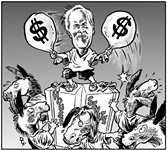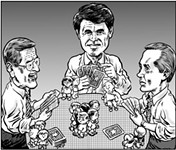Capitol Chronicle
Breathless in Texas: The Lege Takes Yet Another Look at Cleaning Up the Air
By Michael King, Fri., April 6, 2001

Out in the East Texas county of Milam,
Alcoa's smelter commanded the world.
With towering smokestacks and draglines a hummin',
Lignite did burn and pollution did swirl.
Blacker than night spewed particulate matter
Wicked and evil and casting a spell.
While Alcoa's profits got fatter and fatter,
Rockdale was blinded, and so, could not tell.
-- from "Ode to Alcoa," lyrics by Billie Woods
March 26 marked the 30th anniversary of the grandfathered pollution loophole, and environmentalists threw the old boy a birthday party ("with cake & inhalers") on the steps of the Capitol. They sang "Happy Birthday" ("It's the last one for you/Don't ask for more"), and other pop songs nicely adapted for the occasion. (My personal favorite was "Ode to Alcoa," sung to the tune of Marty Robbins' "El Paso.")
For 30 years, since the enactment of the Texas Clean Air Act of 1971, the state's "grandfathered" industrial facilities (about 1,000 of the state's 2,500 active plants) have been exempt from the standard permitting processes and pollution-reducing requirements of the Act. As a group, they annually disseminate roughly 900,000 tons of air pollution into Texas skies (and lungs), more than a third of all the industrial air pollution in the state. Several former legislators -- including co-sponsors of the Clean Air Act -- have recalled that when the grandfathered exemption was established (for plants already in operation or under construction), it was as a "grace period," in response to the repeated assurances of industry and their legislative supporters that grandfathered plants would be short-lived, and the exemption would soon be unnecessary. "Those of us involved in trying to get the bill passed," said former Rep. Bob Gammage, "were assured that the facilities being grandfathered had a useful life of five to eight years, and in some remote circumstances maybe as much as 15 years." Former Houston Rep. Sissy Farenthold said, "Back in 1971, I could have expected that my hair would be white by now, but I certainly did not expect this loophole to still be in effect."
The grandfathered loophole has instead become a state-subsidized competitive advantage for polluting corporations (because they do not have to install pollution-control technology required of newer plants), and one more way private interests reap the profits on community resources (e.g., coal, water, and air) while imposing the costs (e.g., cleanup, health care, and quality of life) on the public at large. Last session the Lege took a bite out of the grandfathered exemption by requiring utility companies -- which desperately wanted deregulation -- to begin permitting and cleaning up their grandfathered facilities (some 50 plants, mostly coal-fired generators, estimated to account for nearly a third of those 900,000 tons). But for the rest, the Bush administration rammed through a "voluntary" program written by industry, the entirely predictable results of which have been virtually nil -- and which even if fully implemented, would largely "succeed" by continuing the same grandfathered emissions under a new name: "permitted" emissions. These polluters have had 30 years in which to "volunteer" to cut emissions -- why on earth should they change their ways now, unless required to do so?
As former Rep. Jim Clark, a Clean Air Act co-sponsor, put it, "When we put in the grandfather loophole, we didn't know any better. Now we have the information that shows how wrong we were to let all those plants be grandfathered. I will add my voice to the others calling for the grandfather loophole to be closed this session, 30 years after we created it."
Don't Hold Your Breath
It's an eminently reasonable request. Two bills currently under consideration at the Lege (Zeb Zbranek's HB 356 and David Bernsen's SB 493) would eliminate the voluntary program by Sept. 1 of this year and require formerly grandfathered facilities to install the best available pollution controls. Predictably, the industry's foot-draggers have responded with Pampa Republican Warren Chisum's HB 3545, which would extend the voluntary program, not begin requiring permits until 2005, and set no deadline for the installation of modern pollution controls. Moreover, Chisum's bill would calcify into Texas law the EPA's distinctions between ozone "attainment" and "non-attainment" regions of the state -- when in fact the entire eastern airshed is increasingly polluted, and more than half the state's citizens now live in places where the air is unhealthy to breathe. Such boundaries would make sense only in a country where the wind never blows.
It's too early to tell which approach will survive the process, but one mordant indicator is that the House bills are both under consideration before the Committee on Environmental Regulation -- chaired by Chisum. Although Zbranek is also a committee member (as is Austin's Dawnna Dukes), it's not easy being green in front of this group. When Robin Schneider of the Texas Campaign for the Environment testified, several committee members dismissed her quotation of former legislators as "hearsay," and seemed concerned less about the actual effects of grandfathered pollution than that Schneider take care to speak respectfully of industry's needs for "flexibility." At nearly midnight, several hours into the hearing, Schneider responded with some impatience, "They've had 30 years of lots of flexibility. It's time we put the health of Texans ahead of their flexibility."
The Alcoa lignite-fired power generator and aluminum smelter in Rockdale, still belching after all these years, remains the state's single greatest point-source of grandfathered pollution (in excess of 100,000 tons a year). An Alcoa spokesman solemnly informed the committee that, under an agreed order with the Texas Natural Resource Conservation Commission, the company has "projected" a reduction in grandfathered emissions of all of 5,800 tons of nitrogen oxide (NOx) -- and that the company was hanging fire on further planned reductions pending the outcome of the session. When Zbranek asked quietly which of the bills under consideration was likely to result in more and faster emissions reductions at Alcoa, the spokesman artfully dodged the question.
Alert readers of The New York Times may have noticed that Paul O'Neill, erstwhile CEO of Alcoa Inc. and now U.S. Treasury Secretary, has finally agreed to sell his more than $100 million in Alcoa stock because of potential conflicts of interest. You may be curious to know Alcoa's liberal estimate of the cost of installing efficient pollution controls at its Rockdale facility (thereby cutting NOx and sulphur dioxide emissions by half or more): $100 million.
Yet despite the Lege's traditional reluctance to confront industry, Tom "Smitty" Smith of Public Citizen expressed guarded optimism on the grandfather bills. He says that with Gov. Bush gone and urban air pollution deadlines coming due under the federal Clean Air Act (requiring Texas to do something serious about pollution, especially in Houston and Dallas/Fort Worth), the political situation has altered. "If the committee delivers too weak a bill to the House," Smitty said, "we can probably win a substantial number of [strengthening] votes on the floor." Industry interests may be able to slow the process, he added, but the politicians know "we've got to be able to get our air clean. ... We know what a failure the voluntary program has been, and it will be very hard to vote for a program which has failed so abysmally."
Sipping the Incentives
Public Citizen is also supporting SB 5, Sen. Buster Brown's attempt to "incentivize" the clean air process by creating mechanisms to encourage (i.e., pay) industry to reduce emissions. The bill would create financial incentives for retrofitting equipment (especially pollution-heavy diesel engines), for the purchase of cleaner cars and trucks, and for better energy standards for homes and appliances. The bill is a direct response to the in-progress State Implementation Plans (SIPs) for Houston, Dallas/Fort Worth, and El Paso, as well as the seemingly inevitable SIPs down the line for Austin, Longview/Tyler, Corpus Christi, etc. Announcing the bill, Brown insisted it was not a "replacement" for the SIPs, but "a way of implementing them." Industry had panicked when the TNRCC's proposed ozone-reducing SIP for Houston (which still doesn't meet federal standards) included such elements as no use of diesel equipment before noon and mandatory staggered no-driving days (along the lines of summertime water rationing). The Houston SIP is under legal attack from both industry and environmental groups, and SB 5 (endorsed by the EPA, the TNRCC, and various industry groups as well as Public Citizen) is an attempt to find other ways to address the problem.
Environmental groups, although they support many of SB 5's specific proposals, are wary. Smitty says he's tired of "losing environmental battles" at the Lege, and that many of the bill's provisions have worked well in other states (e.g. California), but he noted that without ending grandfathering as well as additional measures, SB 5 is only a step (and an uncertain one) in the right direction. Unlike required emissions reductions, SB 5's results are very uncertain, and activists are worried it will be used to "bust the SIPs" -- that is, allow further voluntary wait-and-see while the air gets more and more polluted. "We think there are some good things in this bill," said Mark McCloud of Environmental Defense, "but the big thing is that we have a responsibility to make the Legislature and the citizens aware: This bill does not solve the problems of Houston. It's 2001 -- I don't think we can measure success by 'steps in the right direction,' but only by a SIP that has integrity, that the citizens can rely on and that will achieve real improvement in air quality." McCloud added that it was the TNRCC, not environmentalists, who came up with such "lousy ideas" as no morning construction and no-drive days. "I don't want to question what's in the hearts and minds of the TNRCC," he added, "but the effect of those kinds of proposals does undermine public support for [air pollution reduction]. That's one of the reasons we support the measures in Brown's bill."
SB 5 is also intended to "pay for itself," with various license fees (higher in nonattainment areas), perhaps a gasoline tax, and industry fees collected to fund the incentives, and a new commission to administer research in cleaner technology. Or to put it another way: With the state's tax structure already a nation-leading burden on its poorest citizens, the Lege proposes to use yet more regressive taxation to make those citizens pay for the privilege of cleaning up the air on behalf of the corporations who polluted it, and now don't want to "volunteer" to pay for the damages.
It's difficult to wax enthusiastic about such "incentives." But if we want cleaner air, that's the way we do it in Texas. ![]()
(Citizens can make their opinions on the pending environmental bills known to the members of the Senate Natural Resources Committee, 463-0390, and the House Committee on Environmental Regulation, 463-0776. An overview of the grandfathered pollution issue is available at the Texas Campaign for the Environment Web site: www.texasenvironment.org. For more info on Alcoa's pollution and its plans to expand surface mining in Lee and Bastrop Counties, see www.neighborsforneighbors.com.)
Got something to say on the subject? Send a letter to the editor.








